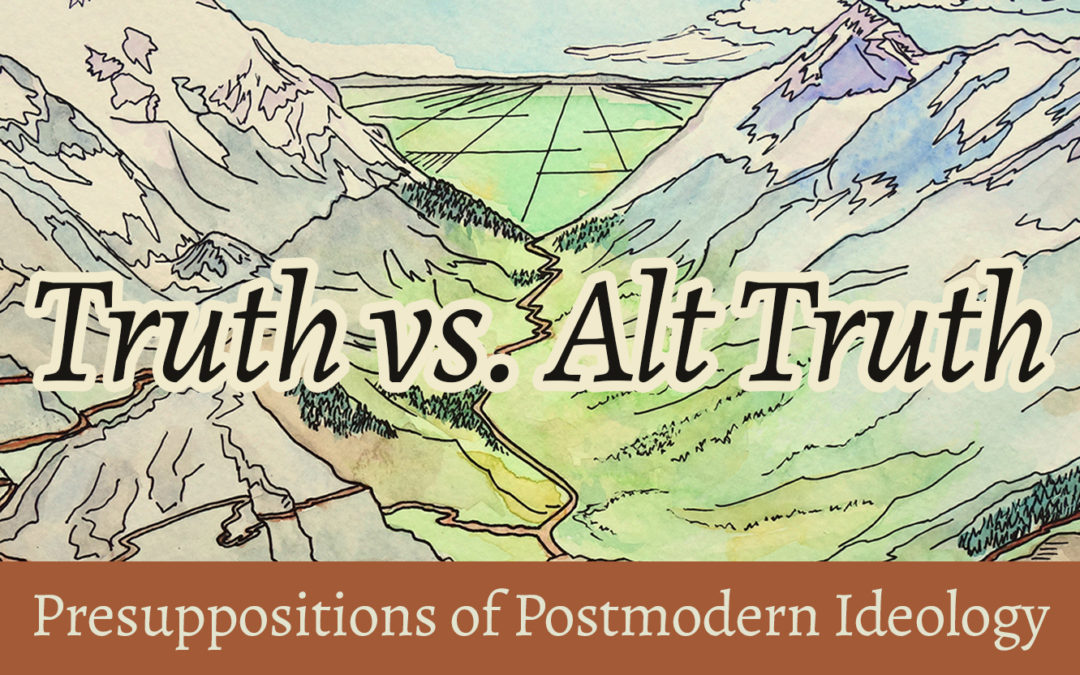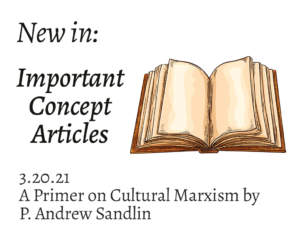A Clip from Post 4
The presuppositions of the knowledge systems of both science and Christianity are seeking an accurate description of reality as a basis for truth in human discourse. The knowledge gained by scientific means is science. The knowledge gained by critical examination of nature and of divine revelation is knowledge of God, theology. The fields of study are overlapping, but different in substantial ways. However, both are seeking knowledge of reality, known and unknown.
Discovering the Presuppositions of the Postmodern Ideology
Ideology: A Definition
The word “ideology” is tossed around a lot, but I am not sure we understand its breadth of meaning. This Britannica article places the concept of ideology in historical context. The following excerpts orient us to the larger concept.
- The word first made its appearance in French as idéologie at the time of the French Revolution, when it was introduced by philosopher -L.-C. Destutt de Tracy as a short name for what he called his “science of ideas.
- The science of ideas was a science with a mission: it aimed at serving people, even saving them, by ridding their minds of prejudice and preparing them for the sovereignty of reason.
- This science of ideas “stays fairly close to Destutt de Tracy’s original conception and may be identified by five characteristics: (1) it contains an explanatory theory of a more or less comprehensive kind about human experience and the external world; (2) it sets out a program, in generalized and abstract terms, of social and political organization; (3) it conceives the realization of this program as entailing a struggle; (4) it seeks not merely to persuade but to recruit loyal adherents, demanding what is sometimes called commitment; (5) it addresses a wide public but may tend to confer some special role of leadership on intellectuals.”
We need to be aware that the term ideology is not just a system of knowledge, a kind of philosophy. An ideology in the sense of the Postmodern Movement’s ideology is a theory on a mission. It is more about doing than about knowing, and this is why this ideology is so difficult to grasp for people who approach this method for bringing about change as if it were a method for gaining knowledge. Both science and theology will be confused until they perceive the Postmodern Movement’s ideology as an ideology on a mission, a sociopolitical force. It is not mainly about knowledge or truth; it is about preferred values in an immediate context.
A Parable of Two Realities
Discovering the presuppositions of the Postmodern Ideology requires a trip into an alternate reality. The trip is not unlike going through C. S. Lewis’ “door in the back of the wardrobe.”
Imagine that all floors slant in one direction, toward the north. Placing a ball on any floor always results in the ball moving north. Whether you put it down with a decisive slam or with a gentle touch, the ball always rolls to the north. In this scenario, the door through “the back of the wardrobe” leads to a land of slanted floors. The trouble with this land is that the slant is not obvious, so people can feel right at home for quite some time.
In this land of slanted floors, you are met by a person who offers to be your guide as he welcomes you to this new reality. You are led on a tour through several buildings. Imagine you brought along a ten-inch plumber’s level. Turning to your guide you ask, “Why do all the floors slant toward the north?”
“Not everyone here would agree with you about the floors being slanted, or in this case, all being slanted toward the north.”
Not realizing you are treading on cultural taboo, you promptly whip out your level and show the guide that the floor is slanted. The level doesn’t lie, the floor is slanted, it is a fact. Not necessarily so in this fantasy land of slanted floors. Knowing that a direct denial of fact would be difficult for you to accept, the guide minimizes the effectiveness of your ten-inch level to judge the slant on a 50-foot floor. After you try to explain that you didn’t mean to assert that you could be perfectly accurate with a ten-inch level rather than a transit level, you encounter more skepticism. “Since you admit your level isn’t absolutely accurate in this matter, you can see why we aren’t focused on the matter of level floors. Those particulars are too complicated to consider around here. We don’t want to put anyone down by telling them that their floors aren’t level; we focus on good relationships here.”
You soon discover that these people not only ignore what you say about not claiming what can be measured perfectly, but they insist on total skepticism. “Since you insist on having everything perfect” (not true, of course), “your views are oppressive.” Why? Because our mission is to build an inclusive community and we don’t want to exclude anyone just because they don’t agree about the scientific facts.
Let’s return to the world we live in. Here is the problem: at the presuppositional level, the Postmodern Ideology is first of all a skepticism as to the possibility of knowing reality. It is a skepticism on a mission. The skepticism is not a healthy skeptical attitude that keeps a person from being gullible; it is a settled disposition–a state of skepticism. Science and theology are caricatured as in the “want to be perfect” class. Their “impossibly perfect” nature casts them as a strawman that can easily be burned.
Why this hostility to truth? Because in the Postmodern reality, the sociopolitical goal must not be resisted: the ideology promises a future IDEAL community, and even truth must be set aside at times in order to realize this inevitable goal of bringing ideal justice to the oppressed and defeat to the oppressors. This value narrative is an example of alt-truth, to be more fully discussed later.
When the Good Decenters the Best
It might be objected that followers of the Postmodern Movement don’t talk about themselves this way. How can a movement that envisions itself as an active force for justice be anything but good? The short answer is that a movement seeking good ends may become a curse if it chooses to use bad means. Even so, such a movement may be a source of justice in particular times and places. These virtuous efforts make it all the more difficult to truly understand or to oppose how the Postmodern Movement is destabilizing society with alt-truth and a movement to decenter truth based on critical description of knowledge if it hinders the mission of the movement.
If instead of limiting our discussion to the arena of presuppositions, we lauded the zeal of young people investing their time and energy to advance justice in social and political causes, we would have a vast supply of examples. Yet, zeal for justice without guidance of truth can become an unguided missile. There is no way to predict the destruction that may happen!
First Peek at the Conclusion
If the full path to the discovery of the presuppositions of Postmodernism were to be explained bit by bit and piece by piece, it would take multiple posts, so I will reveal a lite version of the conclusion. Since the mission of the Postmodern Movement is more about doing than knowing, I will first give a glimpse of what the ideology does relative to truth. The Postmodern Ideology seeks to justify the validity of any knowledge claim by asserting its correspondence to social practice rather than to reality. Instead of a reality check, they prefer a social consensus check. The reality check must be decentered; the social consensus check has first place.
Here is a quote from Britannica Encyclopedia without identification of the context (coming soon). This approach allows me to ease into the bad news, like a gentle report that you have cancer, told to you in about three steps so that you can catch your breath before learning you’re in stage IV. Speaking of a radically different basis of truth,
they [who will be identified later] stressed the dialectical development of human knowledge, socially acquired in the course of practical activity. Individuals can gain knowledge of things only through their practical interaction with those things, framing their ideas corresponding to their practice; and social practice alone provides the test of the correspondence of idea with reality—i.e., of truth.
Note carefully that the human knowledge here is developed dialectically. Evoking the thought of dialogue, it sounds as if it is developed by people talking to each other. The trouble is that such a simple view of the dialectic would be like a surfaced submarine, most of the meaning of the term is undetected. The dialectic is a rich word, as we shall see. But, for now, it can be thought of as “socially talking it over with a difference,” a truth discernment process distinctively different from the tradition of Western Civilization.
Notice that knowledge is also socially acquired in the course of practical activity. So much for philosophy, or theology either.
Now comes the clincher: individuals can gain knowledge of things only through their practical interaction with those things, framing their ideas corresponding to their practice, and social practice alone provides the test of the correspondence of idea with reality—i.e., truth.
In a sentence, alt-truth is not discovered nor revealed; it is socially made. And as we shall see, it is made by a method: the dialectic.
The Rest of the Story
Here is the full section from Britannica:
The theory of knowledge of Marx and Engels started from the materialist premise that all knowledge is derived from the senses. But against the mechanistic view that derives knowledge exclusively from given sense impressions, they stressed the dialectical development of human knowledge, socially acquired in the course of practical activity. Individuals can gain knowledge of things only through their practical interaction with those things, framing their ideas corresponding to their practice; and social practice alone provides the test of the correspondence of idea with reality—i.e., of truth. (emphasis added)
Yes, the theory of knowledge belonging to the Postmodern Movement’s ideology is a Marxian derivative. (Here I am not referring to communism, a particular variant in Marxist thought.) Most people, even those who are strongly influenced by Postmodern Ideology, haven’t made the connection between their approach to knowledge and these two figures. In my next post I will drill down to the presupposition of the dialectic and why knowing the connection to Marxism is important to us today. There is a sea change happening in the views of reality gaining dominance in the spirit of the age. We must press through to knowing truly, even if we know in part.



0 Comments